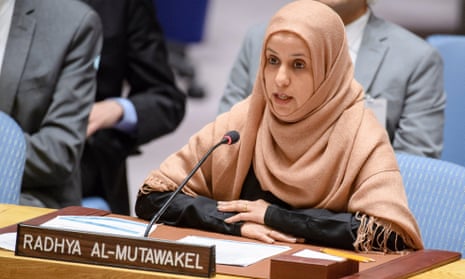During his historic recent visit to the United Arab Emirates, Pope Francis condemned the war in my home country, Yemen, as a terrible humanitarian crisis.
Addressing the world he said: “Let us pray strongly, because there are children who are hungry, who are thirsty – they don’t have medicine and they are in danger of death”.
It is true that all these things are happening, and much worse. Violations are being carried out by all parties involved in the conflict.
But whenever I hear that Yemen is the “worst humanitarian disaster” – or listen to my own words, as I address committee after committee – I feel like I’m listening to a broken record. The need to remind everyone that what we are witnessing is manmade, and not a natural disaster, is constant.
In late January, I was invited to deliver a testimony at the European parliament sub-committee on human rights, a place I had visited in 2016 to give a speech about the impact of drones. It is significant how much knowledge and interest about Yemen has increased since then.
My speech came at the same time that the UK announced more humanitarian aid to Yemen, while the EU boasted that iit is the biggest donor to the budget. Yet all the while they continue to supply arms and support to the Saudi-led coalition, providing the means to continue the war should the fragile ceasefire fail. It is hypocrisy on a grand scale.
Since 2014, my organisation, Mwatana for Human Rights, has documented hundreds of incidents where lives have been lost or violated and civilian infrastructure has been damaged or destroyed – not only by the coalition, but also by Houthi armed groups, local armed groups loyal to the Hadi government and others. They are all bound by a common factor: their behaviour.
What is really sad about the violations in Yemen is that they are preventable. They occur because the parties don’t care. The total lack of accountability, not only to their own but also to the outside world, empowers them to feel as though they can do whatever they want. The last UN Resolution on Yemen was adopted by the security council in December ; it too suggested that the way to maintain peace is though accountability on all sides.
The pope referred to “hunger”, but Yemenis are not suddenly starving. I believe starvation is being used as a weapon of war, by all sides.
Since 2017, Mwatana has been conducting advocacy visits around the world. It is clear to us that the disaster caused by the war in Yemen is being ignored as many countries actively continue to supply the weapons that fuel conflict.
Peace in Yemen is possible, it always has been. Peace is needed now even more than ever, but what we, the people of Yemen, need above all is the political will to achieve it. We are now witnessing what can happen when the international community takes action, placing serious and balanced pressure on all parties to bring them to the negotiating table in Sweden, in what seems to be the most promising chance for peace.
Some urgent actions were discussed in Sweden, from freeing detainees and providing salaries for Yemenis to reopening Sana’a airport and ending the fighting in Hodeida. These confidence-building measures would make the situation significantly less miserable for Yemenis and could, more importantly, lead to a lasting and stable peace agreement. It just needs more pressure.
The international community can play a major role in stopping the war in Yemen, but they need to do much more than just provide aid. Humanitarian support is important, but it is just filling the gaps; you can’t feed a whole nation. States should not just act as humanitarian organisations, as they have the ability to do so much more.
Yemen can be a success story. It offers a chance for the international community to demonstrate that, by working together, it can end a disaster anywhere in the world. If we lose this opportunity, the conflict will not only continue but is likely to get worse. I don’t know if we will have another chance for peace.
We all need a success story, none more than the people of Yemen.
Radhya Al-Mutawakel is a Yemeni human rights defender and co-founder of the Mwatana Organisation for Human Rights
